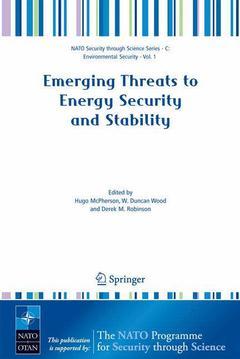Description
Emerging Threats to Energy Security and Stability, 2005
Proceedings of the NATO Advanced Research Workshop on Emerging Threats to Energy Security and Stability, London, United Kingdom, from 23 to 25 January 2004
Nato Security through Science Series C: Series
Coordinators: McPherson Hugo, Wood W.Duncan, Robinson Derek M.
Language: English
Subjects for Emerging Threats to Energy Security and Stability:
Keywords
Publication date: 10-2005
316 p. · 15.5x23.5 cm · Paperback
316 p. · 15.5x23.5 cm · Paperback
Description
/li>Contents
/li>Comment
/li>
Emerging Threats to Energy Security and Stability January 23 to January 25, 2004, Windsor Castle, UK This two-day NATO-sponsored workshop was organised by the Windsor Energy Group and MEC International Ltd with support from NATO?s Science Committee. The workshop was designed to promote a public-private sector exchange on how best to address issues arising in energy security at a time of growing uncertainty. In particular, it sought to assess emerging threats to energy security and stability and discuss new security strategies to protect global energy supplies from regional instability and terrorism. The format involved a wide-ranging international group of poli- formers and advisers from NATO, Partner and other countries, in a unique forum for intensive expert discussion. Background The international community is increasingly conscious of the need to develop new energy security strategies in order to protect global energy supplies from regional instability and terrorism. Energy security is a vital element in international stability. However, a variety of energy-related economic, technical, and military/political factors pose serious challenges to the international community?s pursuit of energy security and stability: The global economy is expected to continue to be largely dependent on oil and gas for the next twenty to thirty years. Current levels of production may need to be doubled in this period, with most of the increment coming from the Gulf States who control 66% of global oil reserves and 40% of global natural gas reserves. There are forecasts of significant capacity shortfalls.
Executive Summary.- A Summary of the Discussions.- Prospects for the Global Energy Market.- An Overview.- A Political Perspective.- An Analytical Perspective.- An Economic Perspective.- National Strategic Energy Interests.- Energy Security and Unresolved Conflict in the Caucasus.- Prospects for Russian Energy.- Evolving Roles of Multilateral Organisations and the Private Sector.- Overview.- The International Energy Forum and Energy Security & Stability.- The View from Brussels.- Regional Challenges: the Middle East.- National Strategic Energy Interests and Creating Regional Stability in the Middle East.- Emerging Threats to Energy Security and Stability.- IRAQ: A Japanese Perspective.- Regional Challenges - North Africa.- Libya.- The North African Challenge.- Regional Challenges - the Caucasus Region - Caspian & Black Sea Basins.- Turkey & Nato.- Prospects for the Caucasus, the Corridor between Two Continents - Keynote Address.- Tatarstan: Euro Islam in the Volga Region.- Critical Energy System Infrastructure (CESI) - Emerging Threats to Shipping and Pipelines.- Shipping: Vital, Vulnerable and Little Understood.- The Straits of Malacca: Critical Sea-Lane Chokepoint.- Background Papers on the World Energy Market.- The Geo-Political Future of the Gulf.- China and Opec.- Egypt — a Promise Yet to be Fulfilled.- Egypt’s Race for Gas Export Markets.- Saudi Arabia.- Saudi Society.- Central Asia and the Caspian Basin.- Initiatives Emanating from the Workshop.- Initiative: Energy Security and Unresolved Conflict in the Caucasus.- Initiative on Pipelines Ports and Shipping Security - Building Public-Private Cooperation.- Energy Security & Nato Strategic Interests After 9/11.- Press Coverage.- Epolitix.- Epolitix.- Bloomberg News.- The Times.
Written by senior professionals in the Energy and Security Sectors Covers prospects for the global energy market from a political, analytic and economic perspective Includes the evolving roles of multilaterals and the private sector in energy security Areas examined include the Middle East, North Africa, The Caucasus as well as the Caspian and Black Sea Basins Also examines the emerging threat to shipping and pipelines
© 2024 LAVOISIER S.A.S.




